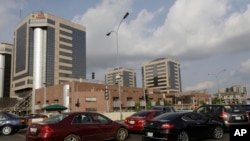On the campaign trail, newly-elected Nigerian President Muhammadu Buhari vowed to stamp out corruption in Nigeria.
To do that, analysts say he must reform the state-owned Nigerian National Petroleum Corporation or NNPC, which has long been dogged by allegations of waste and graft.
Buhari showed he was serious late last month by firing the NNPC’s board.
Dolapo Oni, head of energy research at Ecobank, said that move effectively put him in control of the company.
“I think he has direct access to information from within them and possibly can also, to some extent, micromanage the administration of the NNPC himself,” Oni said.
Oil is the economic backbone of Nigeria, Africa’s largest economy. But proceeds from the petroleum industry are so poorly distributed that only the rich elite benefit from it, while millions live in poverty.
Cleaning up the NNPC has long been seen as crucial to fixing this disparity.
Former central bank governor Lamido Sanusi said in 2013 that the NNPC had not handed over billions of dollars in oil money it owed the government and was fired after making the allegation.
There are risks and rewards to President Buhari’s firing of the NNPC board, said Yvonne Mhango, sub-Saharan Africa economist at Renaissance Capital. Reforming the NNPC may ultimately help Nigeria boost oil production and cut graft, she said.
Without a governing board or a petroleum minister to oversee it, however, the NNPC is at risk of being leaderless.
“For one, it brings around policy paralysis, because now, it’s a sit and wait mode,” she said. “And secondly, the shakeup of any industry would of course have some downside risks.”
Appointments for petroleum minister and other Cabinet postings are not expected until September.




